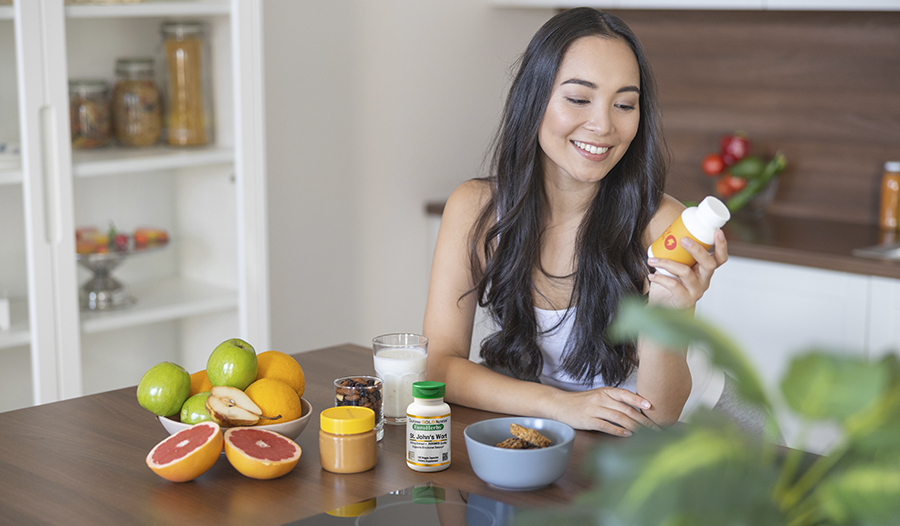Какие растения взаимодействуют с лекарствами? Вот что нужно знать вам (и вашему врачу).

С древних времен различные растения используются для лечения тканей, подавления патогенов, улучшения рациона и настроения. Как и любое сильное лекарство, растительные средства нужно принимать корректным образом и в правильной дозировке, чтобы они были эффективными и, самое главное, безопасными.
В целом, к растительным средствам относят любые растения, которые можно использовать в качестве лекарства, специи или ароматизатора. В этой статье мы рассмотрим, с какими целебными растениями следует быть осторожными, особенно при приеме рецептурных лекарств.
Общее правило, которое будет неоднократно упомянуто в статье: перед началом приема любых новых добавок всегда нужно проконсультироваться с врачом. Кроме того, перед применением какой-либо лечебной травы сначала необходимо поговорить со своим фитотерапевтом или натуропатом.
Как будет указано ниже, многие растительные средства, доступные в магазинах или онлайн, могут быть опасны при употреблении в сочетании с лекарствами или при наличии определенных заболеваний. Врачи, фитотерапевты и даже диетологи проходят всестороннюю подготовку, направленную на безопасное применение растительных средств. Воспользуйтесь их опытом, чтобы по максимуму сохранить свое здоровье!
1. Корень солодки и лекарства для сердца
Корень солодки обладает множеством целебных свойств: противовоспалительными, адаптогенными и даже антибактериальными. Кроме того, он повышает артериальное давление за счет усиленного удержания солей, поэтому он может быть эффективен для лечения гипотензии (низкого давления). Но, соответственно, он опасен при гипертензии (высоком давлении).
Корень солодки часто добавляют в безрецептурные чаи, настойки и лекарства. Кроме того, он нередко входит в состав продуктов с заявленным действием против простуды и гриппа, воспаления или для детоксикации. В списке ингредиентов он иногда приводится под своим латинским названием Glycyrrhiza glabra, а не просто как «солодка» или «лакрица», что только усложняет его выявление на этикетке. Если вы страдаете от высокого давления, при покупках обязательно проверяйте продукты на отсутствие лакрицы или Glycyrrhiza. Также проверьте, что употребляемые вами чаи не содержат этого ингредиента. Дело в том, что солодка может взаимодействовать с диуретиками и другими лекарствами для сердца и снизить их эффективность, увеличив тем сам ваш риск развития сердечно-сосудистых заболеваний.
Определенно стоит отказаться от корня солодки при гипертензии, болезнях сердечно-сосудистой системы или проблемах с задержкой вывода жидкостей. Единственное исключение — деглициризированная солодка. Это солодка, из которой специально удалили глицирризин — основной ингредиент, отвечающий за удержание солей. Если у вас высокое давление, но вы не хотите отказываться от солодки, то деглициризированная солодка может стать подходящим вариантом. Проконсультируйтесь с врачом, прежде чем вводить какие-либо травы в свой рацион, особенно если вы уже принимаете рецептурные лекарства.
2. Зверобой и антидепрессанты
Зверобой обладает противовирусными свойствами и может улучшать настроение, однако он взаимодействует с двумя типами лекарств. Во-первых, он может привести к развитию серотонинового синдрома при приеме вместе с другими лекарствами, влияющими на усвоение серотонина или МАО (антидепрессантами, противоэпилептическими средствами, средствами от диареи и некоторыми другими). Серотониновый синдром может привести к эпилепсии, жару, мышечной ригидности, тремору конечностей, расстройству желудка и, при отсутствии должного лечения, даже смерти. Кроме того, зверобой может усиливать метаболизм противозачаточных средств, снижая тем самым их эффективность. Это может привести к маточному кровотечению, гормональным сбоям и падению эффективности противозачаточных средств. Если вы хотите использовать зверобой для улучшения настроения или профилактики болезней, попросите врача проверить ваш уровень витамина D, железа и витамина B12. По данным исследований, их можно без опасений принимать с большинством лекарств, и устранение их дефицита нередко приводит к безопасному улучшению настроения и работы иммунной системы.
3. Гинкго билоба и аспирин
Ученые исследовали влияние гинкго билоба на психологическое здоровье, работу мозга и здоровье сердечно-сосудистой системы. Он может взаимодействовать с лекарствами вроде варфарина и аспирина — при совместном приеме возможно развитие сильного кровотечения. Перед началом приема гинкго проконсультируйтесь с врачом, особенно если вы принимаете варфарин или аспирин, имеете заболевания сердечно-сосудистой системы или проблемы с кровотечениями/свертываемостью крови. Рассмотрите возможность приема других ноотропов и средств улучшения сосудистого тонуса, например, бакопы или ягод, не взаимодействующих с вашими лекарствами.
4. Растительные слабительные: сенна и каскара
Такие растительные слабительные, как сенна и каскара, часто входят в состав безрецептурных растительных смесей для «поддержки печени», «поддержки почек» и «поддержки кишечника». Их можно принимать кратковременно для быстрого очищения кишечника от пищи, однако их ни в коем случае нельзя использовать более трех дней подряд или более двух недель при периодическом приеме. Дело в том, что действие растительных слабительных (как и любых других) частично обусловлено выделением в кишечнике большего количества электролитов, чем обычно. Со временем это может привести к обезвоживанию и нарушению баланса электролитов. Это может повлиять на передачу электрических импульсов в сердце, мозге и других органах. Кроме того, слабительные могут повлиять на усвоение принимаемых перорально лекарств и снизить эффективность препаратов, направленных на желудочно-кишечные симптомы. При запоре обсудите с врачом, поможет ли вам прием магния или витамина С — они способны облегчить запор без взаимодействия с лекарствами и риска обезвоживания. Если вы ищете способы безопасной детоксикации печени, стоит начать с увеличения количества клетчатки и воды в рационе.
5. Низкодозированные травы для модуляции центральной нервной системы
Есть травы, которые называют «низкодозированными» в связи с их выпуском в крайне слабой дозировке во избежание серьезного вреда здоровью или смерти. Ранее они в основном использовались как обезболивающие — до полного понимания их химического строения и до изобретения лекарств. При применении этих трав необходимо обратиться к профессионалу исключительно высокой квалификации для определения точной дозы или же рассмотреть более безопасную альтернативу. К низкодозированным травам, помимо прочего, относятся:
- белладонна (Atropa belladonna);
- борец клобучковый (Aconitum napellus), также известен как аконит клобучковый или аконит синий;
- переступень белый (Bryonia alba), также известен как бриония белая или адамов корень;
- гельземий вечнозеленый (Gelsemium sempervirens).
Большинство из этих растений воздействуют на нервную систему и могут взаимодействовать с лекарствами, направленными на настроение, боль, эпилепсию и другие симптомы. Ни в коем случае на начинайте использовать их самостоятельно без предварительной консультации с врачом.
6. Растения, нагружающие печень
Все лекарства перерабатываются в печени. Некоторые растительные средства могут повредить печень при чрезмерном или слишком длительном приеме, или при наличии в них плесени, бактерий или тяжелых металлов (например, из-за плохой организации производства и процессов контроля качества).
Известно, что следующие распространенные травы могут повредить печень:
- чапараль (маквис, финбуш);
- корень кавы (корень с анксиолитическим действием, набирающий популярность);
- чистотел;
- туя (особенно эфирное масло, принимаемое внутрь).
Их можно принимать без риска для здоровья, но для этого нужна консультация профессионала. Обязательно предварительно обсудите их прием с врачом, включая форму выпуска и дозировку.
В этот список можно включить еще много растений. Советую не употреблять растительные средства несколько раз в день или многие недели подряд без консультации с врачом, так как любое растение в чрезмерной дозировке может повредить печень. Наберите в PubMed «herb-induced liver injury» (поражение печени растительными средствами), чтобы подробнее ознакомиться с этой темой.
7. «Особый гость»: грейпфрут
Я отдельно упоминаю грейпфрут, так как его сок употребляют более 20% американцев и еще больше человек среди мирового населения. Он может взаимодействовать с ферментами печени и кишечника, повышая концентрацию рецептурных лекарств в крови.
В этом случае возможно усиление или ослабление действия лекарств относительно нормы, даже при их обычной дозировке. Следите за тем, чтобы перед употреблением грейпфрута и приемом лекарств прошло несколько часов. Так вы уменьшите вероятность их нежелательного взаимодействия. Уточните у врача, можно ли употреблять грейпфрут и/или его сок при приеме назначенных лекарств.
Выводы
Несмотря на описанные в этой статье взаимодействия, есть тысячи безопасных и эффективных растительных средств, которые можно использовать для укрепления здоровья при условии грамотной консультации и правильного приема. Запомните, что всегда необходимо рассказывать врачу о приеме растительных средств или добавок, а также обсуждать с врачом подбор средства, подходящего именно вам. Растения тоже обладают лекарственным эффектом, и относиться к ним надо соответственно, чтобы получить наиболее безопасный и оптимальный результат.
Источники:
- “Apparent Mineralocorticoid Excess Syndromes Including Chronic Licorice Ingestion.” Uptodate.com, 2021, www.uptodate.com/contents/apparent-mineralocorticoid-excess-syndromes-including-chronic-licorice-ingestion?search=licorice%20root&source=search_result&selectedTitle=1~150&usage_type=default&display_rank=1. Accessed 5 July 2021.
- Banasik, M., and T. Stedeford. “Plants, Poisonous (Humans).” Encyclopedia of Toxicology, 2014, pp. 970–978, www.sciencedirect.com/science/article/pii/B9780123864543000488, 10.1016/b978-0-12-386454-3.00048-8. Accessed 5 July 2021.
- “BRYONIA: Overview, Uses, Side Effects, Precautions, Interactions, Dosing and Reviews.” Webmd.com, 2020, www.webmd.com/vitamins/ai/ingredientmono-46/bryonia. Accessed 5 July 2021.
- “Clinical Use of St Johns Wort.” Uptodate.com, 2021, www.uptodate.com/contents/clinical-use-of-st-johns-wort?search=licorice%20root&topicRef=1392&source=see_link. Accessed 5 July 2021.
- “Corydalis.” Gaia Herbs, Gaia Herbs, 12 Sept. 2018, www.gaiaherbs.com/blogs/herbs/corydalis. Accessed 5 July 2021.
- He, Shuaibing, et al. “Herb-Induced Liver Injury: Phylogenetic Relationship, Structure-Toxicity Relationship, and Herb-Ingredient Network Analysis.” International Journal of Molecular Sciences, vol. 20, no. 15, 25 July 2019, p. 3633, www.ncbi.nlm.nih.gov/pmc/articles/PMC6695972/, 10.3390/ijms20153633. Accessed 6 July 2021.
- “Hepatotoxicity due to Herbal Medications and Dietary Supplements.” Uptodate.com, 2021, www.uptodate.com/contents/hepatotoxicity-due-to-herbal-medications-and-dietary-supplements?search=licorice%20root&topicRef=1392&source=see_link#H2569065065. “Accessed 5 July 2021.
- “Merriam-Webster Dictionary.” Merriam-Webster.com, 2021, www.merriam-webster.com/dictionary/herb. Accessed 5 July 2021.
- Murphy, Patricia A., et al. “Interaction of St. John’s Wort with Oral Contraceptives: Effects on the Pharmacokinetics of Norethindrone and Ethinyl Estradiol, Ovarian Activity and Breakthrough Bleeding.” Contraception, vol. 71, no. 6, June 2005, pp. 402–408, pubmed.ncbi.nlm.nih.gov/15914127/#:~:text=Conclusion%3A%20St.,might%20interfere%20with%20contraceptive%20effectiveness., 10.1016/j.contraception.2004.11.004. Accessed 5 July 2021.
- “Oxford Languages and Google - English | Oxford Languages.” Oup.com, 2020, languages.oup.com/google-dictionary-en/. Accessed 5 July 2021.
- “Overview of Herbal Medicine and Dietary Supplements.” Uptodate.com, 2021, www.uptodate.com/contents/overview-of-herbal-medicine-and-dietary-supplements?search=licorice%20root&source=search_result&selectedTitle=2~150&usage_type=default&display_rank=2. Accessed 5 July 2021.
- “USDA Plants Database.” Usda.gov, 2021, plants.usda.gov/home/classification/68852. Accessed 5 July 2021.
- Wiart, Christophe. “Alkaloids.” Lead Compounds from Medicinal Plants for the Treatment of Neurodegenerative Diseases, 2014, pp. 1–188, www.sciencedirect.com/science/article/pii/B9780123983732000017, 10.1016/b978-0-12-398373-2.00001-7. Accessed 5 July 2021.
ОТКАЗ ОТ ОТВЕТСТВЕННОСТИ:Информация, содержащаяся в Центре здоровья, не предназначена для постановки диагноза...
















































































 Содержание
Содержание


